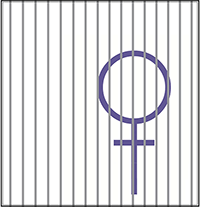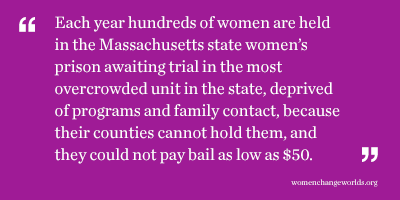
Massachusetts Corrections guidelines permit shackling women prisoners by one foot during birth and according to testimony given to the Joint Committee on the Judiciary in September 2011, women have left the hospital after giving birth shackled at their waist, arms, and legs. Such practices have been deemed a violation of the United Nations Convention against Torture, yet in a national study by the ACLU, such practices have been outlawed in only 18 states. Also, each year hundreds of women are held in the Massachusetts state women’s prison awaiting trial in the most overcrowded unit in the state, deprived of programs and family contact, because their counties cannot hold them, and they could not pay bail as low as $50.
Both situations run counter to the Bangkok Rules adopted by the U.N. General Assembly in December 2010. Officially termed the United Nation Rules for the Treatment of Women Prisoners and Non-Custodial Measures for Women Offenders,” they expand government’s efforts to comply with international minimum standards for the treatment of offenders by emphasizing the special circumstances and needs of women. Certainly, the Rules impact was evident at an international conference, Women, Crime and Criminal Justice Practice: Diversion, Dignity, Desistance and Dignity, held at the University of Cambridge, January 2012. The U.K. participants reported on changes in the policies and practices affecting women offenders in the wake of a scathing report on the treatment of women prisoners issued in 2004, and participants from 18 countries spoke of the challenges of working with female offenders and their reform efforts.
Although the average daily count of women prisoners in the U.S. is over 210,000, compared with 4,000 in the U.K., 2,000 in Italy, and 700 in Sweden, the circumstances and needs of women offenders throughout the world are remarkably similar. These include reproductive health and pregnancy; mental illness and substance abuse (often as co-occurring disorders); the separation from dependent children for whom they have sole custody; experiences of violence and trauma; lack of education and training; sexual victimization by criminal justice personnel; and restricted eligibility for state benefits.
trauma; lack of education and training; sexual victimization by criminal justice personnel; and restricted eligibility for state benefits.
Many people in the U.S. believe that discussions of human rights belong in third and fourth world cultures; for many it is indeed surprising that a handbook, Treatment of Women Prisoners, based on the Bangkok Rules and written by advocates in Sierra Leone, could benefit women in the U.S. However, I recommend that policy makers, advocates and criminal justice personnel read this handbook or others like it together with recent ACLU reports on these important topics.
The Massachusetts Women’s Justice Network (MWJN) platform for change in 2013, will focus on the reducing the numbers of women held in the state’s pre-trial unit and women’s health needs. For more information on the MWJN’s work, email ekates@wellesley.edu, and to learn more about the Bangkok Rules and ACLU efforts refer to:
ACLU (2012). Briefing Paper: the Shackling of Pregnant Women & Girls in U.S. Prisons, Jails, and Youth Detention Centers. Washington DC: ACLU (2012). Briefing Paper: the Shackling of Pregnant Women & Girls in U.S. Prisons, Jails, and Youth Detention Centers. Washington DC: ACLU
Mahtani, S. (2012) United Nations Rules for the Treatment of Women Prisoners: A Handbook. Freetown: Sierra Leone. Advocaid.
Pradier, C. (2012) Penal Reform and Gender: Update on the Bagkok Rules. DCAF (Geneva Center for the Democratic Control of Armed Forces).
Erika Kates, Ph.D. is a Senior Research Scientist at the Wellesley Centers for Women, Wellesley College, who directs the Gender & Justice Project on Women Offenders.
When you subscribe to the blog, we will send you an e-mail when there are new updates on the site so you wouldn't miss them.
Comments 1
Thank you for this article. I have worked for years on the issue of children with incarcerated parents bringing thousands to see their parents in prison. I have seen the abuse and lack of gender responsiveness in the women's prisons and as a citizen it scares me. Many of the women I have worked with are victims themselves of life long abuse and the system further traumatizes them.